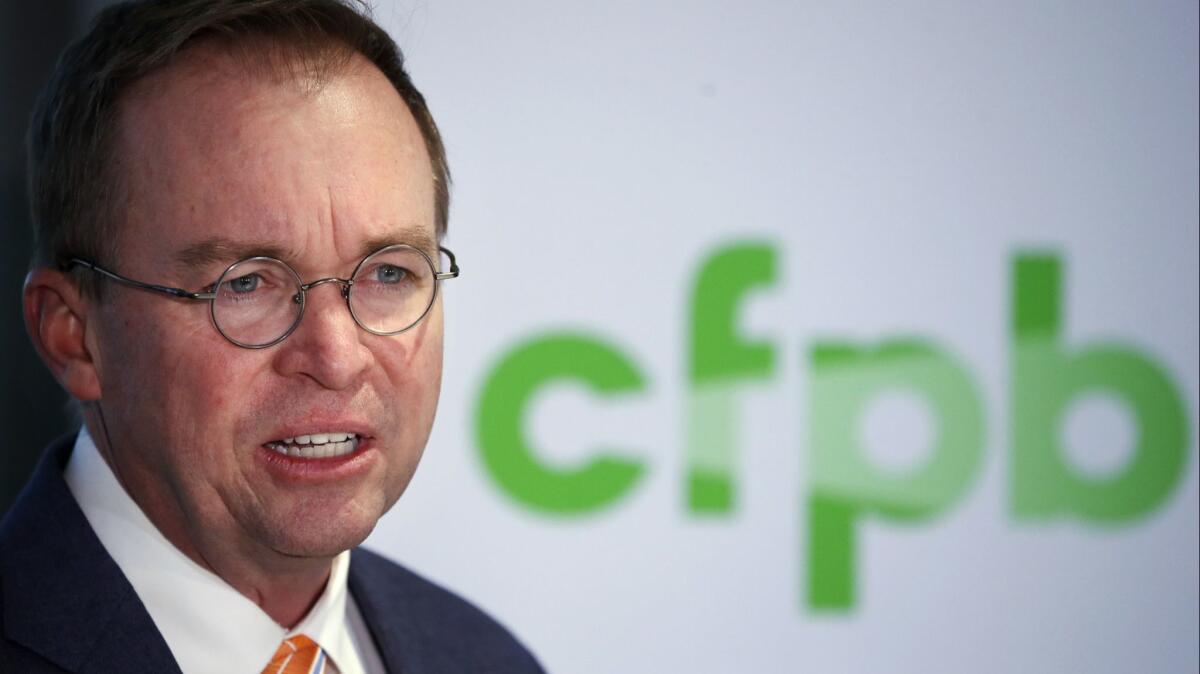Editorial: Mick Mulvaney’s message to bankers: You have to pay to play

- Share via
It’s standard operating procedure for lawmakers to declare that campaign donations by special interests do not sway them, even though the vast majority of their constituents don’t believe it. That’s what makes acting Consumer Finance Protection Bureau director Mick Mulvaney’s comments to a banking industry trade association Tuesday so remarkable. Not only did Mulvaney fail to offer the customary disclaimers about the influence of money in politics, he said that, back when he was a Republican congressman from South Carolina, he would sit down with interest groups if, and only if, they contributed to his campaign.
According to the campaign finance site OpenSecrets.org, nearly 90% of the money Mulvaney raised for his 2016 re-election campaign came from business political action committees, and about half of it came from the finance industry he now regulates at the CFPB. Make that the industry he’s supposed to regulate, given that Mulvaney has blocked new rules at the bureau, targeted several major existing ones for reversal and dropped a number of pre-existing enforcement actions since taking over in November. (Mulvaney told lawmakers this month that he is “committed to making sure the Bureau’s regulations work not only for those who use consumer financial products and services but also for those who provide them.”)
Addressing the American Banking Assn. in Washington on Tuesday, Mulvaney urged its members to lobby lawmakers more vigorously. That was the point at which he also told them that as a congressman, he met with only two groups: lobbyists who’d ponied up money for his reelection and constituents. Lobbyists who didn’t fork over a donation? They didn’t get heard. Mulvaney’s message was clear: Bankers needed to pay to play in order to advance their agenda.
The bureau will be lucky to survive Mulvaney’s tenure.
It’s an agenda that Mulvaney supports, of course. He and the bankers’ association both want to reduce the bureau’s independence and rule-making authority. But he’s not an ideologue in Congress anymore — he’s now in charge of an agency created to protect consumers against unfair and predatory practices by banks and other lenders. Yet he seems to think his job is to liberate, not regulate, the companies he oversees.
Mulvaney dangled another goody in front of his audience Tuesday, raising the possibility that the bureau no longer will give the public access to the complaints it collects about financial products and services. According to a transcript obtained by The Times’ Jim Puzzanghera, Mulvaney said, “I don’t see anything in here that says I have to run a Yelp for financial services sponsored by the federal government.”
He’s right, technically. The 2010 law that created the bureau requires it only to set up a toll-free number and a website for consumer complaints, to share those complaints with other regulators when appropriate and to report on them to Congress annually. Cutting off public access, though, prevents anyone outside the government from giving the data the Yelp treatment. If the information isn’t reliable, as Mulvaney and industry officials argue, Congress should change the law rather than having the bureau bury it.
Mulvaney — who in his spare time serves as the architect of the White House’s disastrous, debt-crazed budget policy — has emphasized the importance of humility when it comes to the bureau’s regulatory authority. But his endorsement of pay-to-play politics and his ham-handed reversals of the bureau’s operations are anything but humble. The bureau will be lucky to survive his tenure.
Follow the Opinion section on Twitter @latimesopinion and Facebook
UPDATES:
2:46 p.m.: This editorial was updated with a new source for one of the quotes from Mulvaney’s speech.
More to Read
A cure for the common opinion
Get thought-provoking perspectives with our weekly newsletter.
You may occasionally receive promotional content from the Los Angeles Times.









